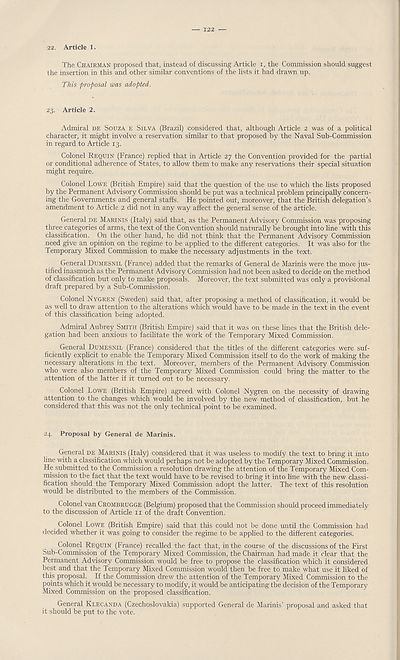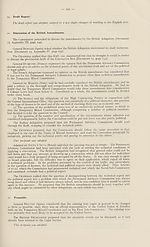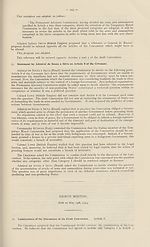Armament > Conference for the control of the international trade in arms, munitions and implements of war
(124)
Download files
Complete book:
Individual page:
Thumbnail gallery: Grid view | List view

122
22. Article 1.
The Chairman proposed that, instead of discussing Article i, the Commission should suggest
the insertion in this and other similar conventions of the lists it had drawn up.
This proposal was adopted.
23. Article 2.
Admiral de Souza e Silva (Brazil) considered that, although Article 2 was of a political
character, it might involve a reservation similar to that proposed by the Naval Sub-Commission
in regard to Article 13.
Colonel Requin (France) replied that in Article 27 the Convention provided for the partial
or conditional adherence of States, to allow them to make any reservations their special situation
might require.
Colonel Lowe (British Empire) said that the question of the use to which the lists proposed
by the Permanent Advisory Commission should be put was a technical problem principally concern¬
ing the Governments and general staffs. He pointed out, moreover, that the British delegation’s
amendment to Article 2 did not in any way affect the general sense of the article.
General de Marinis (Italy) said that, as the Permanent Advisory Commission was proposing
three categories of arms, the text of the Convention should naturally be brought into line with this
classification. On the other hand, he did not think that the Permanent Advisory Commission
need give an opinion on the regime to be applied to the different categories. It was also for the
Temporary Mixed Commission to make the necessary adjustments in the text.
General Dumesnil (France) added that the remarks of General de Marinis were the more jus¬
tified inasmuch as the Permanent Advisory Commission had not been asked to decide on the method
of classification but only to make proposals. Moreover, the text submitted was only a provisional
draft prepared by a Sub-Commission.
Colonel Nygren (Sweden) said that, after proposing a method of classification, it would be
as well to draw attention to the alterations which would have to be made in the text in the event
of this classification being adopted.
Admiral Aubrey Smith (British Empire) said that it was on these lines that the British dele¬
gation had been anxious to facilitate the work of the Temporary Mixed Commission.
General Dumesnil (France) considered that the titles of the different categories were suf¬
ficiently explicit to enable the Temporary Mixed Commission itself to do the work of making the
necessary alterations in the text. Moreover, members of the Permanent Advisory Commission
who were also members of the Temporary Mixed Commission could bring the matter to the
attention of the latter if it turned out to be necessary.
Colonel Lowe (British Empire) agreed with Colonel Nygren on the necessity of drawing
attention to the changes which would be involved by the new method of classification, but he
considered that this was not the only technical point to be examined.
24. Proposal by General de Marinis.
General de Marinis (Italy) considered that it was useless to modify the text to bring it into
line with a classification which would perhaps not be adopted by the Temporary Mixed Commission.
He submitted to the Commission a resolution drawing the attention of the Temporary Mixed Com¬
mission to the fact that the text would have to be revised to bring it into line with the new classi¬
fication should the Temporary Mixed Commission adopt the latter. The text of this resolution
would be distributed to the members of the Commission.
Colonel van Crombrugge (Belgium) proposed that the Commission should proceed immediately
to the discussion of Article 11 of the draft Convention.
Colonel Lowe (British Empire) said that this could not be done until the Commission had
decided whether it was going to consider the regime to be applied to the different categories.
Colonel Requin (France) recalled the fact that, in the course of the discussions of the First
Sub-Commission of the Temporary Mixed Commission, the Chairman had made it clear that the
Permanent Advisory Commission would be free to propose the classification which it considered
best and that the Temporary Mixed Commission would then be free to make what use it liked of
this proposal. If the Commission drew the attention of the Temporary Mixed Commission to the
points which it would be necessary to modify, it would be anticipating the decision of the Temporary
Mixed Commission on the proposed classification.
General Klecanda (Czechoslovakia) supported General de Marinis’ proposal and asked that
it should be put to the vote.
22. Article 1.
The Chairman proposed that, instead of discussing Article i, the Commission should suggest
the insertion in this and other similar conventions of the lists it had drawn up.
This proposal was adopted.
23. Article 2.
Admiral de Souza e Silva (Brazil) considered that, although Article 2 was of a political
character, it might involve a reservation similar to that proposed by the Naval Sub-Commission
in regard to Article 13.
Colonel Requin (France) replied that in Article 27 the Convention provided for the partial
or conditional adherence of States, to allow them to make any reservations their special situation
might require.
Colonel Lowe (British Empire) said that the question of the use to which the lists proposed
by the Permanent Advisory Commission should be put was a technical problem principally concern¬
ing the Governments and general staffs. He pointed out, moreover, that the British delegation’s
amendment to Article 2 did not in any way affect the general sense of the article.
General de Marinis (Italy) said that, as the Permanent Advisory Commission was proposing
three categories of arms, the text of the Convention should naturally be brought into line with this
classification. On the other hand, he did not think that the Permanent Advisory Commission
need give an opinion on the regime to be applied to the different categories. It was also for the
Temporary Mixed Commission to make the necessary adjustments in the text.
General Dumesnil (France) added that the remarks of General de Marinis were the more jus¬
tified inasmuch as the Permanent Advisory Commission had not been asked to decide on the method
of classification but only to make proposals. Moreover, the text submitted was only a provisional
draft prepared by a Sub-Commission.
Colonel Nygren (Sweden) said that, after proposing a method of classification, it would be
as well to draw attention to the alterations which would have to be made in the text in the event
of this classification being adopted.
Admiral Aubrey Smith (British Empire) said that it was on these lines that the British dele¬
gation had been anxious to facilitate the work of the Temporary Mixed Commission.
General Dumesnil (France) considered that the titles of the different categories were suf¬
ficiently explicit to enable the Temporary Mixed Commission itself to do the work of making the
necessary alterations in the text. Moreover, members of the Permanent Advisory Commission
who were also members of the Temporary Mixed Commission could bring the matter to the
attention of the latter if it turned out to be necessary.
Colonel Lowe (British Empire) agreed with Colonel Nygren on the necessity of drawing
attention to the changes which would be involved by the new method of classification, but he
considered that this was not the only technical point to be examined.
24. Proposal by General de Marinis.
General de Marinis (Italy) considered that it was useless to modify the text to bring it into
line with a classification which would perhaps not be adopted by the Temporary Mixed Commission.
He submitted to the Commission a resolution drawing the attention of the Temporary Mixed Com¬
mission to the fact that the text would have to be revised to bring it into line with the new classi¬
fication should the Temporary Mixed Commission adopt the latter. The text of this resolution
would be distributed to the members of the Commission.
Colonel van Crombrugge (Belgium) proposed that the Commission should proceed immediately
to the discussion of Article 11 of the draft Convention.
Colonel Lowe (British Empire) said that this could not be done until the Commission had
decided whether it was going to consider the regime to be applied to the different categories.
Colonel Requin (France) recalled the fact that, in the course of the discussions of the First
Sub-Commission of the Temporary Mixed Commission, the Chairman had made it clear that the
Permanent Advisory Commission would be free to propose the classification which it considered
best and that the Temporary Mixed Commission would then be free to make what use it liked of
this proposal. If the Commission drew the attention of the Temporary Mixed Commission to the
points which it would be necessary to modify, it would be anticipating the decision of the Temporary
Mixed Commission on the proposed classification.
General Klecanda (Czechoslovakia) supported General de Marinis’ proposal and asked that
it should be put to the vote.
Set display mode to:
![]() Universal Viewer |
Universal Viewer | ![]() Mirador |
Large image | Transcription
Mirador |
Large image | Transcription
Images and transcriptions on this page, including medium image downloads, may be used under the Creative Commons Attribution 4.0 International Licence unless otherwise stated. ![]()
| League of Nations > Armament > Conference for the control of the international trade in arms, munitions and implements of war > (124) |
|---|
| Permanent URL | https://digital.nls.uk/195383375 |
|---|
| Shelfmark | LN.IX |
|---|
| Description | Over 1,200 documents from the non-political organs of the League of Nations that dealt with health, disarmament, economic and financial matters for the duration of the League (1919-1945). Also online are statistical bulletins, essential facts, and an overview of the League by the first Secretary General, Sir Eric Drummond. These items are part of the Official Publications collection at the National Library of Scotland. |
|---|---|
| Additional NLS resources: |
|

